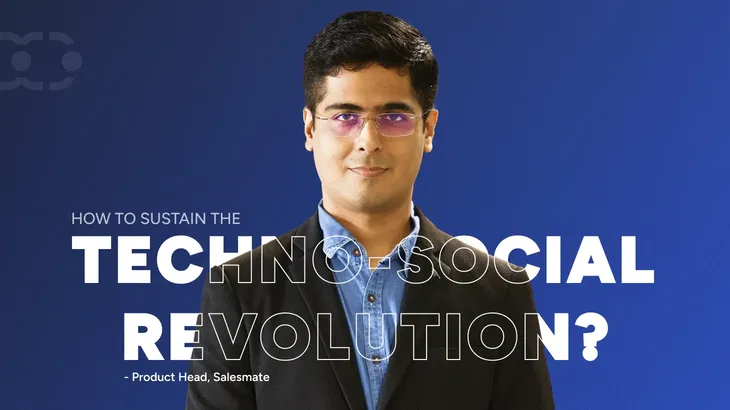The techno-social revolution—a term that encapsulates the deep interdependence between technology and society—is not just an era of innovation. It’s a movement that redefines how we live, work, and interact.
Much like a symphony, where each instrument plays a vital role, this revolution harmonizes human ingenuity with digital advancements.
The world now stands at a crossroads, where the relentless tide of progress meets the delicate shores of humanity’s collective values.
As the Product Head of Salesmate, a leading CRM platform, I’ve witnessed this dance firsthand. Businesses, technologies, and aspirations collide and collaborate in ways reminiscent of stars forging constellations in an infinite sky.
In this article, I’ll delve into strategies to sustain this revolution, sharing my insights on technology, CRM, marketing, and branding, alongside lessons from history and reflections on our shared future.
A brief history of revolutions
Throughout history, revolutions have acted as catalysts, altering the trajectory of civilizations and reshaping societal norms.
From the agricultural revolution, which laid the groundwork for settled life, to the industrial revolution that mechanized labor, each upheaval brought profound change.
- Agricultural revolution: Enabled the shift from nomadic tribes to structure communities. With tools like the plow, humans learned to harness nature.
- Industrial revolution: Introduced mass production, steam engines, and the birth of modern capitalism, forever altering industries and urban life.
- Digital revolution: Ushered in computers, the internet, and an unprecedented level of global connectivity.
Now, the techno-social revolution stands on their shoulders, amplifying the changes of its predecessors with exponential velocity.
Unlike previous revolutions that focused on tangible resources, this era revolves around intangible assets—data, connectivity, and human relationships.
Impact on people and the world
Revolutions have always been double-edged swords. The industrial revolution created jobs but also widened social inequality. Similarly, the techno-social revolution offers immense potential but demands vigilance to ensure it benefits everyone.
- Economic empowerment: Technology creates new markets and democratizes access to tools. Freelancers can work globally, and small businesses can compete with giants.
- Social shifts: Social media platforms enable movements, from climate activism to societal justice campaigns.
- Challenges: The digital divide persists, with millions lacking access to the internet or the skills to leverage technology effectively.




The techno-social revolution—a term that encapsulates the deep interdependence between technology and society—is not just an era of innovation. It’s a movement that redefines how we live, work, and interact.
Much like a symphony, where each instrument plays a vital role, this revolution harmonizes human ingenuity with digital advancements.
The world now stands at a crossroads, where the relentless tide of progress meets the delicate shores of humanity’s collective values.
As the Product Head of Salesmate, a leading CRM platform, I’ve witnessed this dance firsthand. Businesses, technologies, and aspirations collide and collaborate in ways reminiscent of stars forging constellations in an infinite sky.
In this article, I’ll delve into strategies to sustain this revolution, sharing my insights on technology, CRM, marketing, and branding, alongside lessons from history and reflections on our shared future.
A brief history of revolutions
Throughout history, revolutions have acted as catalysts, altering the trajectory of civilizations and reshaping societal norms.
From the agricultural revolution, which laid the groundwork for settled life, to the industrial revolution that mechanized labor, each upheaval brought profound change.
Now, the techno-social revolution stands on their shoulders, amplifying the changes of its predecessors with exponential velocity.
Unlike previous revolutions that focused on tangible resources, this era revolves around intangible assets—data, connectivity, and human relationships.
Impact on people and the world
Revolutions have always been double-edged swords. The industrial revolution created jobs but also widened social inequality. Similarly, the techno-social revolution offers immense potential but demands vigilance to ensure it benefits everyone.
The techno-social landscape: A prelude
Technology has reshaped societal norms. Think about the evolution from Gutenberg’s printing press to the smartphone. Each advancement has amplified our connectivity and knowledge exchange.
The modern-day techno-social revolution is characterized by Artificial Intelligence (AI), Internet of Things (IoT), and Big Data—tools that empower but also challenge us to adapt responsibly.
The numbers speak volumes:
These figures underscore a critical point: Technology isn’t slowing down, and neither should we.
My approach to sustaining the techno-social revolution
1. Technology as an enabler, not a replacement
The first principle I advocate is to view technology as an enabler of human potential, not a replacement. For instance, at Salesmate, we use AI to analyze customer data and predict sales trends.
But it’s not the AI that builds trust with a client; it’s the human salesperson armed with insights from the AI.
Why this matters:
Actionable steps:
2. Reimagining CRM for the future
CRM systems, in my view, are the epicenter of the techno-social revolution. They bridge the gap between businesses and customers, making relationships more meaningful.
But sustaining this revolution means evolving CRM from mere data repositories to predictive, intuitive systems.
Key features of next-gen CRMs:
At Salesmate, we’ve integrated AI to analyze customer sentiment. This not only improves customer satisfaction but also empowers businesses to preemptively address issues.
Benefits:
Unified customer experience
Faster decision-making
Read to Stay One Step Ahead of Your Customers?
Use Salesmate’s sales forecasting template to gather accurate data and predict your sales with confidence.
3. Marketing: from transactional to transformational
Marketing in the techno-social era is no longer about selling; it’s about storytelling. Customers resonate with brands that share their values. This philosophy aligns perfectly with Simon Sinek’s famous assertion: “People don’t buy what you do; they buy why you do it.”
Strategies for transformational marketing:
4. Branding: building a legacy
In a world inundated with choices, branding is your identity. It’s what makes a customer choose your product over a competitor’s.
My branding philosophy:
Quote to reflect on: Jeff Bezos famously said, “Your brand is what other people say about you when you’re not in the room.” At Salesmate, we’ve taken this to heart, ensuring every interaction reflects our commitment to customer success.
Metrics to measure branding success:
Philosophical reflections on the human element
The techno-social revolution is, at its core, a human endeavor. As philosopher Marshall McLuhan once said, “We shape our tools, and thereafter our tools shape us.” This duality is evident in how technology both empowers and challenges us.
Balancing progress with purpose:
Conclusion
Sustaining the techno-social revolution isn’t just about adopting the latest technology. It’s about:
At Salesmate, we’re committed to this vision. Whether it’s through our CRM innovations, our marketing strategies, or our branding efforts, we strive to lead by example.
But this is not a journey we can undertake alone. I invite you to join us in shaping a future where technology and humanity thrive together.
Let’s make the techno-social revolution a legacy worth sustaining.
Samir Motwani
Samir Motwani is the Product Head & Co-founder at Salesmate, where he focuses on reinventing customer relationship management through innovative SaaS solutions that drive business efficiency and enhance user satisfaction.